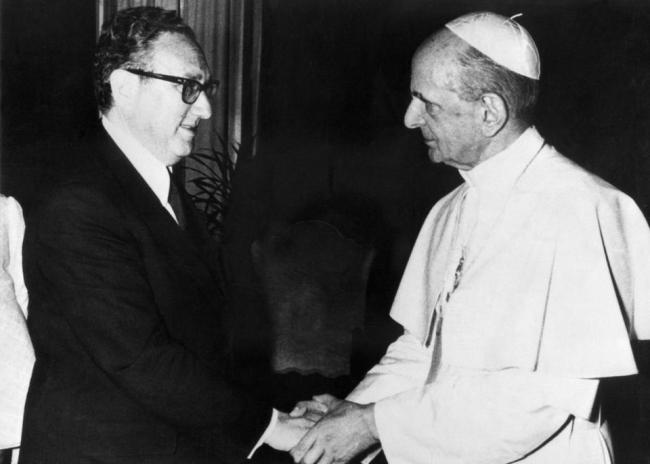The man who said no to free love: Paul VI on first step to sainthood
By Korea HeraldPublished : Oct. 19, 2014 - 20:29
VATICAN CITY (AFP) ― Pope Paul VI, the man who cracked down on free love during the 1968 revolution and carried out sweeping changes to the Church, will be beatified on Sunday in his first step towards sainthood.
Giovanni Battista Montini, a softly spoken cardinal from northern Italy, was elected pope in 1963 and held Saint Peter’s chair for 15 years in a difficult period for the Roman Catholic Church, which saw many believers and priests up sticks as populist rebellions swept across the West.
His papacy was marked by a growing secularization and liberation of morals, and while the polarization of Cold War politics did little to ease his rule he was also hampered by a reputation for being weak and overly cautious.
But Paul VI is credited with being one of Pope Francis’ models, a humble man in many ways, to whom the Argentine pope frequently refers in his speeches.
Giovanni Battista Montini, a softly spoken cardinal from northern Italy, was elected pope in 1963 and held Saint Peter’s chair for 15 years in a difficult period for the Roman Catholic Church, which saw many believers and priests up sticks as populist rebellions swept across the West.
His papacy was marked by a growing secularization and liberation of morals, and while the polarization of Cold War politics did little to ease his rule he was also hampered by a reputation for being weak and overly cautious.
But Paul VI is credited with being one of Pope Francis’ models, a humble man in many ways, to whom the Argentine pope frequently refers in his speeches.

The intellectual Paul VI continued the Second Vatican Council launched by his predecessor Pope John XXIII in 1962, winding it up in 1965 and implementing its numerous reforms, including efforts to dialogue with other religions and a greater role for lay people.
He was a pope of great initiative. The first pilgrim pope ― crossing continents on his trips to meet the faithful, he was also the first to attempt to reform the Vatican’s powerful Curia, the first to hold weekly general audiences with the common man in Saint Peter’s Square and seek the opinions of non believers.
He is most famous, however, for reaffirming the Church’s ban on artificial contraception ― despite the fact that his own birth control commission, set up to advise the Vatican, voted overwhelming to lift the prohibition.
The decision enraged many Catholics at a time when believers were embracing sexual freedom and women were demanding the right to use the birth control pill.
Paul VI’s path to sainthood began earlier this year when the Vatican’s Congregation for the Causes of Saints approved his first miracle, the apparent healing of an unborn child in 2001 in the United States who had a high risk of brain damage.
Doctors offered the mother an abortion, but she refused and instead prayed for Paul VI’s intercession using a fragment of the pope’s clothing given to her by a nun and her child, who is now thirteen and appears to be healthy.
Having made saints of John Paul II and John XXIII in a lavish do earlier this year, Francis will beatify Montini in a simple ceremony aimed at honoring a man who, like the 77-year-old current pope, shunned pomp and the spoils of power.
Just as Francis refused to wear the traditional gold cross, Paul VI set aside the jewel-encrusted papal tiara shortly after his election in 1963, laying it on the altar of Saint Peter’s Basilica and donating its value to the poor.
The ceremony has been timed to coincide with the end of a meeting of the world’s bishops, for it was Paul VI who introduced the tradition of holding such synods.
The current meeting has debated whether and to what extent the Church should modernize. Ironically, it was after just such a synod that the Brescia-born pope cracked down on sexuality.
His beatification may not bode well for reform-minded bishops today, as they try to open up the Church to those who live in sin, such as remarried divorcees and homosexuals.
Paul VI’s followers, John Paul II and Benedict XVI, also did their utmost to uphold the Church’s traditional roots.
-
Articles by Korea Herald











![[Hello India] Hyundai Motor vows to boost 'clean mobility' in India](http://res.heraldm.com/phpwas/restmb_idxmake.php?idx=644&simg=/content/image/2024/04/25/20240425050672_0.jpg&u=)








